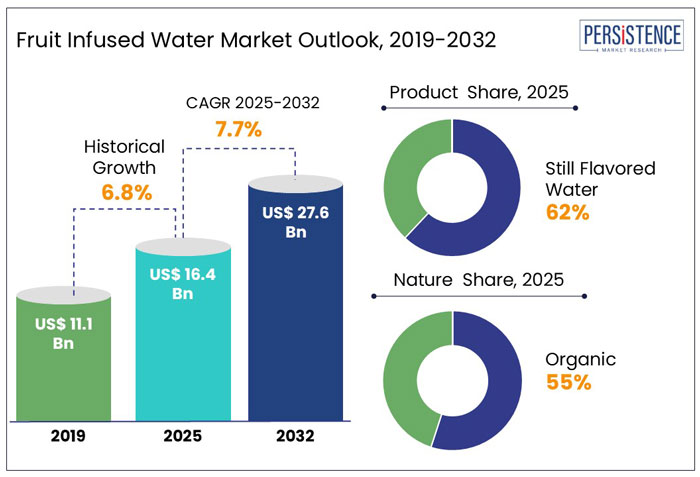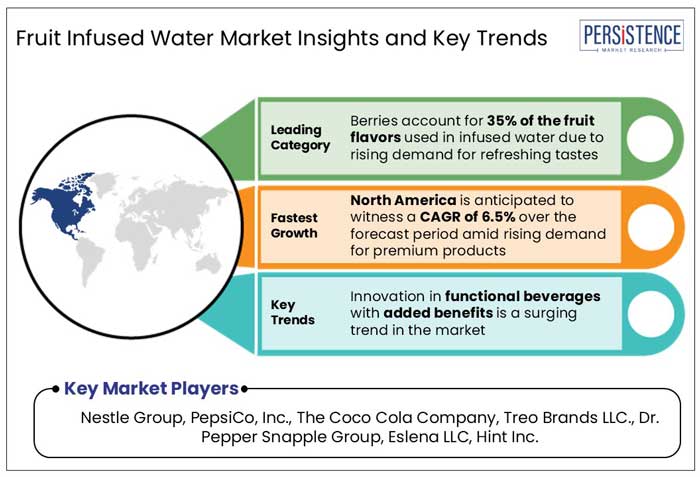Industry: Food and Beverages
Published Date: January-2025
Format: PPT*, PDF, EXCEL
Delivery Timelines: Contact Sales
Number of Pages: 183
Report ID: PMRREP29674
The fruit infused water market is estimated to increase from US$ 16.4 Bn in 2025 to US$ 27.6 Bn by 2032. The market is projected to record a CAGR of 7.7% during the forecast period from 2025 to 2032.
Surveys reveal that 72% of consumers actively seek beverages with natural ingredients, with fruit infused water becoming a top choice for its health benefits and refreshing taste. Demand for low-calorie drinks is surging, with 65% of consumers preferring beverages with no added sugars or artificial sweeteners, a key selling point for fruit infused waters. Over 40% of consumers choose fruit-infused water for its added benefits like vitamins, antioxidants, and natural hydration, making it a functional beverage.

Key Highlights of the Market
|
Market Attributes |
Key Insights |
|
Fruit Infused Water Market Size (2025E) |
US$ 16.4 Bn |
|
Projected Market Value (2032F) |
US$ 27.6 Bn |
|
Global Market Growth Rate (CAGR 2025 to 2032) |
7.7% |
|
Historical Market Growth Rate (CAGR 2019 to 2023) |
6.8% |
North America dominates the global market for fruit-infused water, holding a significant share of around 38% in 2025. The market's growth in this region is primarily driven by rising health consciousness among consumers, who increasingly turn to healthy alternatives to sugary beverages.
In the U.S., consumers are mainly focused on fitness and wellness, leading to a greater demand for beverages that offer hydration and added benefits like detoxification and immunity-boosting properties. The convenience of ready-to-drink fruit-infused water and its appeal as a refreshing, low-calorie alternative to soda has made it a popular choice in the region.
Presence of leading brands, innovative product offerings, and strong retail channels contribute to the market's sustained growth in North America. As the wellness trend continues to gain momentum, fruit-infused water is becoming a staple in several households, further solidifying the region's leading position in the global market.
Based on product type, the market is divided into still and sparkling flavored water. Among these two prominent categories, still flavored water dominates the market with 62% share in 2025. This is due to increasing consumer preference for hydration without the added fizziness or carbonation found in sparkling water.
Still flavored water is often perceived as a more refreshing and soothing beverage option, making it ideal for people seeking a healthier alternative to sugary drinks and sodas. With natural fruit extracts or infusions, still flavored water offers a subtle yet refreshing taste, packed with the benefits of vitamins and antioxidants from the fruits used.
Consumers are drawn to the convenience and clean hydration that still water provides, as it can be enjoyed throughout the day, whether at home, during exercise, or on the go. The trend of wellness and mindful consumption has pushed still flavored water to the forefront, with its growing appeal among health-conscious individuals.
Demand for still flavored water is also driven by its versatility, as it pairs well with various fruits, herbs, and botanicals. Brands continually innovate with new flavor combinations and premium ingredients to meet diverse consumer preferences. With the continuous rise in consumer awareness around health and wellness, the still flavored water segment is set to maintain its dominant position in the fruit infused water industry.
Based on nature, the market is divided into organic and conventional. Out of these, the organic nature of fruit infused water leads the market with 55% share in 2025 due to consumer’s increasing awareness of health and sustainability.
Organic fruit-infused water offers a natural and chemical-free alternative to conventional options, appealing to conscious individuals who are concerned about their food and drink choices. Organic products are produced without synthetic pesticides or fertilizers, which benefits personal health and aligns with environmental sustainability goals.
Health-conscious consumers are particularly drawn to organic fruit-infused waters. These waters contain natural fruit extracts and herbs that provide essential vitamins, minerals, and antioxidants without artificial additives or preservatives.
Increasing popularity of organic and clean-label products across various food and beverage sectors has boosted demand for organic fruit-infused water. Consumers gravitate toward brands emphasizing purity, transparency, and sustainability.
The fruit infused water market has emerged as a vibrant and healthy alternative to sugary beverages, offering a refreshing way to stay hydrated while enjoying natural flavors. As consumers increasingly prioritize health and wellness, fruit-infused water has gained popularity as it provides a refreshing taste without added sugars, artificial colors, or preservatives.
With growing shift toward cleaner, functional beverages, fruit infused water is capturing the attention of health-conscious individuals worldwide. It has become a go-to choice for those looking to enhance their hydration experience with the added benefits of antioxidants, vitamins, and natural flavors derived from fruits like berries, citrus, and tropical varieties.
As consumers become more aware of the potential health risks associated with artificial additives, they clearly prefer beverages with clean, transparent ingredient lists. Organic fruit infused waters, made without synthetic pesticides or fertilizers, are leading the charge in this trend. They offer consumers a healthier option with minimal environmental impact, aligning with the global movement toward sustainable and eco-friendly products.

The fruit infused water market has seen a steady rise in demand over the years, driven by shifting consumer preferences toward healthier beverage options. The market experienced steady growth from 2019 to 2023 as more consumers began opting for alternatives to sugary sodas and high-calorie drinks.
Growing focus on health and wellness, along with increasing awareness of the dangers of artificial sweeteners, has been a significant factor in the rise of fruit-infused water. Introduction of flavors like citrus, berries, and tropical fruits, often combined with the promise of added antioxidants and vitamins, made these beverages a popular choice among health-conscious individuals.
Over the forecast period, the market is set to boom, spurred by increasing consumer shift toward natural, functional beverages. Growth is anticipated to be fueled by rising adoption of organic fruit-infused waters, a preference for clean-label products, and a higher demand for sustainable and eco-friendly packaging.
The market also benefits from large-scale beverage companies investing in product innovation to meet consumer demand for flavorsome yet health-boosting options. As more consumers seek to improve their hydration experience, fruit-infused water will likely be at the forefront of the beverage industry in the forecast period.
Rising Consumer Preference for Healthy, Low-calorie Drinks
One of the primary growth drivers for the fruit infused water market is the increasing demand for healthy, low-calorie beverages. As consumers become more health conscious, they are turning away from sugary sodas and artificial beverages, which contribute to weight gain and health problems.
Fruit infused water offers a refreshing, low-calorie alternative that still satisfies the desire for a flavorful drink. These waters are typically free from added sugars, artificial sweeteners, and preservatives, making them a healthier choice.
Rising cases of lifestyle diseases such as obesity, diabetes, and heart conditions have led several individuals to seek out drinks that promote hydration without compromising their health. This preference aligns perfectly with the market, driving demand for these functional and refreshing beverages.
As awareness around wellness continues to rise, fruit infused waters, with their added benefits of vitamins and antioxidants from natural fruits, are gaining significant popularity. For example,
Increasing Focus on Functional Beverages and Hydration
A significant growth driver for the market is the rising consumer focus on functional beverages that provide health benefits beyond basic hydration. Fruit infused waters are increasingly being marketed as more than just a refreshing drink to boost hydration and support overall wellness.
Consumers are now looking for drinks that provide added value, such as vitamins, antioxidants, and electrolytes, all of which can be found in fruit-infused waters. These drinks are not only hydrating but are also seen as an easy way to improve skin health, digestion, and boost immunity. With increasing awareness of the benefits of proper hydration, especially in light of global health challenges, functional beverages like fruit infused water are becoming immensely popular.
Limited Shelf Life of Natural Ingredients
The limited shelf life of fruit infused water is a significant restraint in this market. Since these beverages often rely on fresh fruit extracts and natural flavors without artificial preservatives, they are more prone to spoilage.
It makes logistics and inventory management more challenging for manufacturers and retailers. Short shelf life also affects consumer purchasing behavior, as buyers may hesitate to choose a product that might expire quickly, especially in bulk purchases.
Retailers must deal with higher wastage rates, further driving up costs. For small-scale players, this can be a key barrier to scaling their operations and maintaining consistent distribution. Addressing this issue with innovative preservation techniques while staying true to the ‘all-natural’ promise is essential for the market's sustainable growth.
Innovation in Functional Beverages with Added Benefits
The fruit infused water market has a significant opportunity to tap into the rising functional beverages trend. Consumers are seeking drinks that not only hydrate but also provide additional health benefits, such as improved immunity, better digestion, or enhanced skin health.
Brands can cater to these wellness-focused preferences by incorporating superfoods, probiotics, or collagen into fruit-infused waters. Adding immune-boosting ingredients like ginger or turmeric or digestion-friendly herbs like mint can elevate a brand’s product line and create a unique selling point.
Functional fruit-infused waters appeal to busy, health-conscious individuals looking for convenient ways to support their wellness goals. Companies embracing innovation in this space will likely unlock new revenue streams and gain a competitive edge in the market.
The market for fruit infused water is highly competitive, with established beverage companies and emerging health-focused brands striving for market share. Key players include Nestlé S.A., PepsiCo, The Coca-Cola Company, Hint Water, and Danone, each leveraging their extensive distribution networks and brand equity to dominate the market.
Emerging players like Spindrift and Hellowater focus on innovation, offering unique flavors and functional benefits to cater to niche, health-conscious consumer segments. Growing demand for organic and clean-label beverages prompts companies to develop eco-friendly packaging and sustainable sourcing practices.
Recent Developments in the Fruit Infused Water Market
|
Attributes |
Details |
|
Forecast Period |
2025 to 2032 |
|
Historical Data Available for |
2019 to 2023 |
|
Market Analysis |
US$ Billion for Value |
|
Key Regions Covered |
|
|
Key Market Segments Covered |
|
|
Key Companies Profiled in the Report |
|
|
Report Coverage |
|
|
Customization and Pricing |
Available upon request |
By Product Type
By Nature
By Flavor
By Distribution Channel
By Region
To know more about delivery timeline for this report Contact Sales

The global market for fruit infused water is valued at US$ 16.4 Bn in 2025.
The global demand is estimated to reach US$ 27.6 Bn by 2032.
Global demand is projected to rise at 7.7% CAGR from 2025 to 2032.
North America leads the global market for fruit infused water.
Nestle Group, PepsiCo, Inc., and The Coco Cola Company are few of the key players.